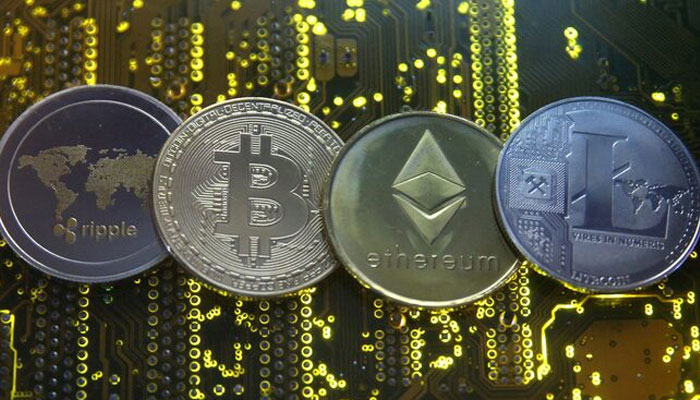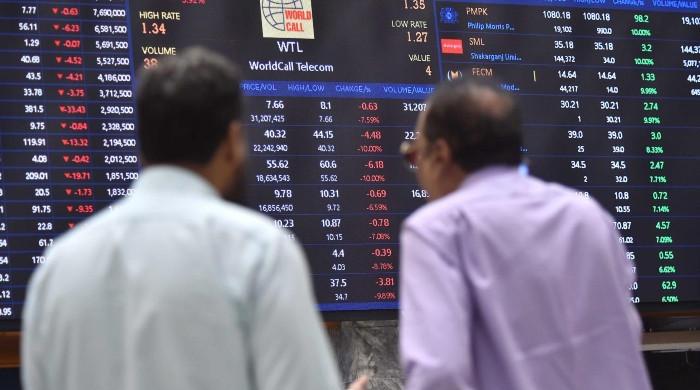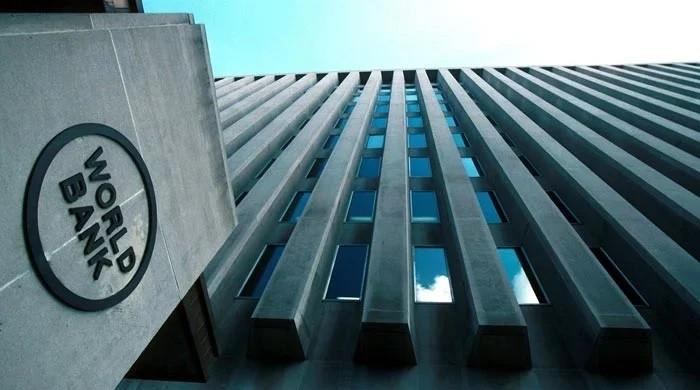Govt mulls regulations as crypto fraud, criminal cases surge
Proposal being considered for introduction of digital currency backed by Pakistani rupee
February 03, 2025

- PML-N's Senator Afnan Ullah tables Virtual Assets Bill 2025.
- Bill seeks to regulate and formally manage virtual assets sector.
- Aims at establishing regulatory framework for digital asset market.
Amid increasing fraud and criminal cases related to cryptocurrencies in the country, the government has started reviewing proposals to introduce regulations for cryptocurrency and blockchain technology, The News reported on Monday.
With the possibility of a law being introduced soon, officials have said that the government was not only reviewing proposals for regularising cryptocurrency and blockchain but also considering the introduction of a Pakistani digital currency to strengthen the Pakistani rupee.
A proposal is being considered for the introduction of a digital currency backed by the Pakistani rupee, which would have legal status under the State Bank of Pakistan (SBP) laws.
The development comes as ruling party Pakistan Muslim League-Nawaz's (PML-N) Senator Dr Afnan Ullah Khan introduced the Virtual Assets Bill 2025 — a groundbreaking piece of legislation aimed at establishing a regulatory framework for the rapidly growing digital asset market, including cryptocurrencies and blockchain technologies, in the country.
This bill seeks to regulate and formally manage the virtual assets sector in Pakistan to ensure that it operates within a legal framework.
The bill aims to address key issues such as security, fraud prevention and market stability. The proposed legislation comes at a time when digital assets are gaining global popularity, and the country is striving to align with international standards to protect the interests of investors and consumers.
Country's economic hub, Karachi, recently witnessed a shocking incident where private individuals and police personnel allegedly collaborated in a short-term kidnapping.
The victim, Arsalam Malik, a businessman associated with cryptocurrency, was abducted, and 340,000 USDT (a cryptocurrency) was transferred from his account to those of the perpetrators.
When this development surfaced in the media, it spread like wildfire, especially given the rising interest in digital currencies in the country. Just like in other parts of the world, thousands or even millions of Pakistanis are investing in cryptocurrency and showing interest in the digital currency market.
However, this incident has amplified the concerns of those already apprehensive about the lack of a clear government policy on cryptocurrency. The absence of a decision by the government on whether digital currencies are legal or illegal has also left investors in a state of uncertainty.
This ambiguity has not only paved the way for various forms of fraud but also discouraged victims from filing complaints due to fear and distrust.
The recent short-term kidnapping case has heightened fears among cryptocurrency traders and investors. In addition to the risk of scams, they now face the alarming possibility of being abducted and robbed of their digital assets.
The regulatory vacuum has enabled fraudulent activities to thrive, with some individuals within institutions taking advantage of the situation to exploit unsuspecting citizens.
While fraud cases related to cryptocurrency have been reported in the past, this incident stands out as the first of its kind where police personnel allegedly partnered with private individuals to execute a digital robbery through a short-term kidnapping.
Experts emphasise that if the government were to legalise cryptocurrency, Pakistan could align itself with global trends while addressing domestic concerns.
Recognising and regulating cryptocurrency firms would not only ensure traceability but also drastically reduce the prevalence of fraud.
Since the rise of crypto around 2015-16 in Pakistan, nearly two dozen cases have been registered across the country pertaining to crime involving digital currency. Out of these, almost half were filed with the Federal Investigation Agency's (FIA's) Cybercrime Circle in Karachi alone.
Nadir Khan, a journalist who has covered such cases, said the core issue lies in the absence of a clear policy on cryptocurrency from the government.
"Whenever courts inquire about crypto-related cases, the government's stance remains ambiguous, stating that they are still deliberating on whether to declare cryptocurrency officially illegal or legal. Until its status is officially determined, it remains a grey area, effectively treated as illegal."
He added that the lack of a clear policy from the government has created an environment where fraud is rampant, and many individuals and companies operating in the cryptocurrency space in Pakistan are forced to do so discreetly.
"Not all of these companies are fraudulent — several are legitimate — but they too are compelled to operate under the radar due to the absence of proper regulation," Khan explained.
"These companies are neither approved by the Pakistan Telecommunication Authority (PTA) nor licensed by the Pakistan Software Export Board, nor are they monitored by any SBP team. They often use untraceable IPs, making it almost impossible to track them in cases of crypto-related fraud. While authorities can identify intermediaries, reaching the masterminds behind such scams remains a significant challenge."
He said that if cryptocurrency was legalised in Pakistan, the entire ecosystem could be regulated, making it traceable and significantly reducing the prevalence of fraud.
A notable example of the consequences of lack of regulation is the 2020-2021 Binance-related scam, in which fraudulent entities posing as Binance orchestrated an Rs250 billion scam.
To this day, the real culprits remain at large.
Globally, the cryptocurrency market has seen fluctuations, such as Bitcoin’s rise during US President Donald Trump's first presidency, a slowdown during former US president Joe Biden's tenure, and an anticipated resurgence with Trump's return. The trend indicates continued growth and adoption of digital currencies worldwide.
Cryptocurrency offers a form of digital currency that can be withdrawn at any time. However, the biggest issue in Pakistan remains the lack of recognition for companies, leaving users vulnerable to fraud.
Cryptocurrency has been gaining traction in Pakistan, with prominent figures like Waqar Zaka and Arsalan Malik being regarded as pioneers in the field.
The Anti-Violent Crime Cell (AVCC) police, which is handling the case of Malik's abduction, arrested eight suspects, including two policemen, in connection with the case and recovered Rs12 million rupees in cash, a Mercedes car worth approximately Rs7 million rupees and prize bonds valued at Rs900,000 from their possession.
Speaking to The News, Malik shared insights into the recent case of cryptocurrency theft after the trader’s short-term kidnapping. He mentioned that most of the main suspects had been arrested, yet the stolen cryptocurrency had not been recovered.
"Just like how bank-to-bank transfers can be reversed, cryptocurrency transactions can also be reversed. It's not as difficult as it seems. Over 70% of the amount that was stolen is still traceable. This is a slightly technical process, but it's not impossible. For those who know how it can take mere seconds or minutes to reverse the stolen amount. However, despite this, no recovery has been made yet," he explained.
Malik further highlighted that while cryptocurrency trading had been going on for years, the real surge in interest came in 2021, as digital currencies gained global prominence.
"The absence of a defined regulatory framework not only causes confusion but also allows room for criminal activities to flourish," he stated.
Lamenting that the progress in the recovery case remained limited to what the police had initially shared with the media, he confirmed that no further recoveries had been made beyond that point.
Experts, including Malik, agree that until the government clarifies its stance on cryptocurrency, fraudulent activities and crimes related to digital currency will continue to rise in Pakistan.
They also say that scams and crimes are more prevalent among people involved in software houses, IT-related businesses, call centres, online gambling, or digital currency.
This is because these activities are either illegal or their status is unclear, making it easier to blackmail the victims. Many victims are hesitant to register their cases because they fear getting entangled in legal issues. Even when a victim does come forward and files a case, they often end up retracting or handling the matter privately to avoid further complications.
This is why the police and specialised units take advantage of the situation, targeting such individuals to make large sums of money in a short period with minimal effort and little risk.
AVCC SSP Anil Haider stated that since it was a kidnapping for ransom case, the AVCC had been doing its part and successfully resolved the case in a timely manner. He also mentioned that the involved criminals were arrested.
On the other hand, the SBP's stance on cryptocurrency remains unchanged. The central bank issued circulars whereby all financial institutions and payment system operators were advised to refrain from processing, using, trading, holding, transferring value, promoting and investing in cryptocurrencies.
Further, the SBP also issued a public advisory, cautioning the general public about risks associated with cryptocurrencies and the non-availability of legal protection or recourse in the event of a loss, for any reason.











